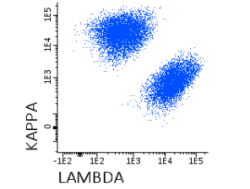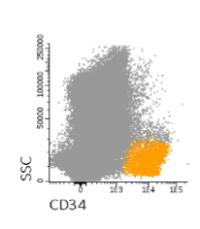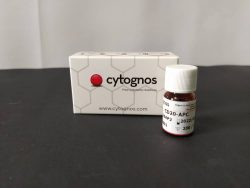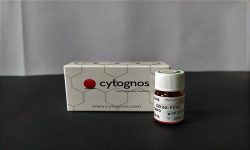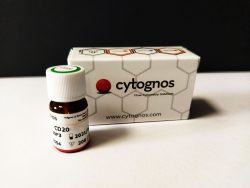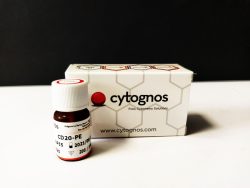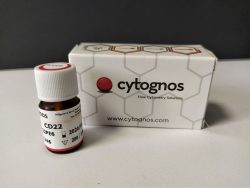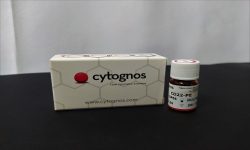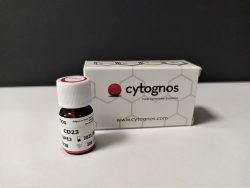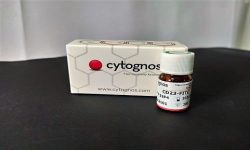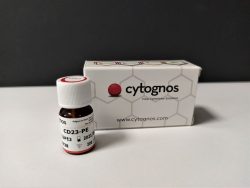Archives: فروشگاه
Showing 401–420 of 651 results
فیلتر ها-
آنتی بادیهای فلوسایتومتری
آنتی بادی مونوکلونال فلوسایتومتری Lambda-APC-C750TM ، کلون Polyclonal
Rated 0 out of 5Name: Flow Cytometry Antibody Lambda-APC-C750TM, Clone Polyclonal
- Antibody Lambda-APC-C750TM is a polyclonal antibody (pAb) labelled with R-Phycoerythrin (PE) and designed for use as a direct immunofluorescence reagent in the identification and enumeration of cells that express human Lambda immunoglobulin Light Chains by Flow Cytometry (FC). Antibodies to Lambda Light Chains are useful for the identification of clonal excess in B-cell lymphoproliferative disorders together with a panel of other antibodies. Anti-Lambda Light Chains reacts with free Lambda chains as well as Lambda chains in intact immunoglobulin molecules. This reagent must be used by FC qualified personal.
SUMMARY AND EXPLANATION
Human lymphocytes may be classified in three main populations according to their biological function and their cell surface antigen expression: T lymphocytes, B lymphocytes and Natural Killer cells (NK). B lymphocytes are the producers of antibodies and mediate humoral immunity particularly effective against toxins, whole bacteria, and free viruses. Most B cells, with the exception of pre-B progenitors, pre B-cells, and mature plasma cells, express immunoglobulin on their surface. Each cell expresses only one light chain type (Kappa or Lambda). In normal peripheral blood and lymph nodes, there is a mixture of Kappa positive and Lambda positive cells, with two-thirds of the cells expressing Kappa and one-third expressing Lambda. Since lymphoid neoplasms are usually clonal expansions of a single cell, malignant cells uniformly express the same Light Chain isotype. Neoplastic B cell lymphoprolipherative disorders can frequently be suspected based on the demonstration of a marker predominance of cells expressing a single Light Chain type. The Lambda immunoglobulin Light Chain count is generally expressed as a percentage of B cells present in the sample that can be determined by FC based on its positive expression of CD19. Since every flow cytometer has different operating characteristics each laboratory must determine its optimal operating procedure and the combination of markers used to identify the target cell population.
REAGENT COMPOSITION
Purified polyclonal antibody Anti-human Lambda Light Chains, Goat F(ab’)2, conjugated with R-Phycoerythrin (PE), supplied in phosphate buffered saline with 0.09% (m/v) sodium azide.
- Amount per 0,5 ml vial: 100 tests (5 µl pAb to 106 cells).
- Reagents are not considered sterile.
-
آنتی بادیهای فلوسایتومتری
آنتی بادی مونوکلونال فلوسایتومتری Lambda-FITC ، کلون Polyclonal
Rated 0 out of 5Name: Flow Cytometry Antibody Lambda-FITC, Clone Polyclonal
- Antibody Lambda-FITC in a goat polyclonal antibody (pAb) labelled with fluorescein isothiocyanate (FITC) and designed for use as a direct immunofluorescence reagent in the identification and enumeration of cells that express human Lambda immunoglobulin Light Chains by flow cytometry. Antibodies to Lambda Light Chains are useful for the identification of clonal excess in B-cell lymphoproliferative disorders together with a panel of other antibodies. Anti-Lambda Light Chains reacts with free Lambda chains as well as Lambda chains in intact immunoglobulin molecules. This reagent must be used by flow cytometry qualified personal.
SUMMARY AND EXPLANATION
Human lymphocytes may be classified in three main populations according to their biological function and their cell surface antigen expression: T lymphocytes, B lymphocytes and Natural Killer cells (NK). B lymphocytes are the producers of antibodies and mediate humoral immunity particularly effective against toxins, whole bacteria, and free viruses. Most B cells, with the exception of pre-B progenitors, pre B-cells, and mature plasma cells, express immunoglobulin on their surface. Each cell expresses only one light chain type (Kappa or Lambda). In normal peripheral blood and lymph nodes, there is a mixture of Kappa positive and Lambda positive cells, with two-thirds of the cells expressing Kappa and one-third expressing Lambda. Since lymphoid neoplasms are usually clonal expansions of a single cell, malignant cells uniformly express the same Light Chain isotype. Neoplastic B cell lymphoprolipherative disorders can frequently be suspected based on the demonstration of a marker predominance of cells expressing a single Light Chain type. The Lambda immunoglobulin Light Chain count is generally expressed as a percentage of B cells present in the sample that can be determined by flow cytometry based on its positive expression of CD19. Since every flow cytometer has different operating characteristics each laboratory must determine its optimal operating procedure and the combination of markers used to identify the target cell population.
REAGENT COMPOSITION
Purified polyclonal antibody Anti-human Lambda Light Chains, Goat F(ab’)2, conjugated with fluorescein isothiocyanate (FITC), supplied in phosphate buffered saline with 0,09% (m/v) sodium azide.
- Purification: Affinity chromatography
- Amount per 0,5 mL vial: 100 tests (5 µL pAb to 106 cells).
- Reagents are not considered sterile.
-
آنتی بادیهای فلوسایتومتری
آنتی بادی مونوکلونال فلوسایتومتری Lambda-PE ، کلون Polyclonal
Rated 0 out of 5Name: Flow Cytometry Antibody Lambda-PE, Clone Polyclonal
- Antibody Lambda-PE is a polyclonal antibody (pAb) labelled with R-Phycoerythrin (PE) and designed for use as a direct immunofluorescence reagent in the identification and enumeration of cells that express human Lambda immunoglobulin Light Chains by Flow Cytometry (FC). Antibodies to Lambda Light Chains are useful for the identification of clonal excess in B-cell lymphoproliferative disorders together with a panel of other antibodies. Anti-Lambda Light Chains reacts with free Lambda chains as well as Lambda chains in intact immunoglobulin molecules. This reagent must be used by FC qualified personal.
SUMMARY AND EXPLANATION
Human lymphocytes may be classified in three main populations according to their biological function and their cell surface antigen expression: T lymphocytes, B lymphocytes and Natural Killer cells (NK). B lymphocytes are the producers of antibodies and mediate humoral immunity particularly effective against toxins, whole bacteria, and free viruses. Most B cells, with the exception of pre-B progenitors, pre B-cells, and mature plasma cells, express immunoglobulin on their surface. Each cell expresses only one light chain type (Kappa or Lambda). In normal peripheral blood and lymph nodes, there is a mixture of Kappa positive and Lambda positive cells, with two-thirds of the cells expressing Kappa and one-third expressing Lambda. Since lymphoid neoplasms are usually clonal expansions of a single cell, malignant cells uniformly express the same Light Chain isotype. Neoplastic B cell lymphoprolipherative disorders can frequently be suspected based on the demonstration of a marker predominance of cells expressing a single Light Chain type. The Lambda immunoglobulin Light Chain count is generally expressed as a percentage of B cells present in the sample that can be determined by FC based on its positive expression of CD19. Since every flow cytometer has different operating characteristics each laboratory must determine its optimal operating procedure and the combination of markers used to identify the target cell population.
REAGENT COMPOSITION
Purified polyclonal antibody Anti-human Lambda Light Chains, Goat F(ab’)2, conjugated with R-Phycoerythrin (PE), supplied in phosphate buffered saline with 0.09% (m/v) sodium azide.
- Amount per 0,5 ml vial: 100 tests (5 µl pAb to 106 cells).
- Reagents are not considered sterile
-
آنتی بادیهای فلوسایتومتری
آنتی بادی مونوکلونال فلوسایتومتری Lambda-PerCP-Cyanine5.5 ، کلون Polyclonal
Rated 0 out of 5Name: Flow Cytometry Antibody Lambda-PerCP-Cyanine5.5, Clone Polyclonal
- Lambda-PerCP-Cyanine5.5 is a polyclonal antibody (pAb) labelled with the tandem Peridin chlorophyll protein-Cyanine 5.5 (PerCP-Cyanine5.5) and designed for use as a direct immunofluorescence reagent in the identification and enumeration of cells that express human Lambda immunoglobulin Light Chains by flow cytometry (FC). Antibodies to Lambda Light Chains are useful for the identification of clonal excess in B-cell lymphoproliferative disorders together with a panel of other antibodies. Anti-Lambda Light Chains reacts with free Lambda Chains as well as Lambda Chains in intact immunoglobulin molecules. This reagent must be used by FC qualified personal.
SUMMARY AND EXPLANATION
Human lymphocytes may be classified in three main populations according to their biological function and their cell surface antigen expression: T lymphocytes, B lymphocytes and Natural Killer cells (NK). B lymphocytes are the producers of antibodies and mediate humoral immunity particularly effective against toxins, whole bacteria, and free viruses. Most B cells, with the exception of pre-B progenitors, pre B-cells, and mature plasma cells, express immunoglobulin on their surface. Each cell expresses only one light chain type (Kappa or Lambda). In normal peripheral blood and lymph nodes, there is a mixture of Kappa positive and Lambda positive cells, with two-thirds of the cells expressing Kappa and one-third expressing Lambda. The Lambda immunoglobulin Light Chain count is generally expressed as a percentage of B cells present in the sample which can be determined by flow cytometry based on its positive expression of CD19. Since every flow cytometer has different operating characteristics each laboratory must determine its optimal operating procedure and the combination of markers used to identify the target cell population.
REAGENT COMPOSITION
Purified polyclonal antibody Anti-human Lambda Light Chains, Goat F(ab’)2, conjugated with the tandem Peridin chlorophyll protein-Cyanine 5.5 (PerCP- Cyanine5.5), supplied in phosphate buffered saline with containing 1% (m/v) BSA and 0.09% (m/v) sodium azide.
- Amount per vial: 50 tests (3 µL pAb to 106 cells).
- Reagents are not considered sterile.
-
آنتی بادیهای فلوسایتومتری
آنتی بادی مونوکلونال فلوسایتومتری NG2-PE ، کلون 7.1
Rated 0 out of 5Name: Flow Cytometry Antibody NG2-PE, Clone 7.1
- Antibody NG2-PE is a monoclonal antibody (mAb) labelled with R-phycoerythrin (PE) designed for flow cytometry (FC) use as a direct immunofluorescence reagent in the identification and enumeration of NG2 antigen-expressing cells.
SUMMARY AND EXPLANATION
FC is a powerful tool in analytical and quantitative characterization of cells which provides rapid and multiparametric analysis of heterogeneous cell populations on a cell-by-cell basis. Flow cytometry is performed on cell suspension after incubating it with fluorescentlabelled antibodies directed against specific cellular proteins. Positive cells relative fluorescence intensity indicates the amount of antibody bonded to specific cell sites providing information about antigen expression. NG2, is an integral membrane chondroitin sulfate proteoglycan expressed by human malignant melanoma and other cells and plays a role in angiogenesis-dependent processes. NG2 has been associated with chromosomal aberrations in approximately 1-10 % of AML (Acute myeloid leukemia) patients. NG2 has been selected by EuroFlow consortium in its AML and BCP-ALL antibody panels.
REAGENT COMPOSITION
The purified monoclonal NG2 antibody conjugated with R-phycoerythrin (PE) is supplied in phosphate-buffered saline (PBS) containing 0.1% sodium azide.
- Clone: 7.1
- Isotype: IgG1.
- Amount per vial: 100 tests (10 µl mAb per determination).
- Reagent is considered non-sterile.
-
آنتی بادیهای فلوسایتومتری
آنتی بادی مونوکلونال فلوسایتومتری TCRgd-PECyanine7 ، کلون 11F2
Rated 0 out of 5Name: Flow Cytometry Antibody TCRgd-PECyanine7, Clone 11F2
- Antibody TCRgd-PECyanine7 is a monoclonal antibody (mAb) labelled with the tandem R-Phycoerythrin-Cyanine 7 (PECy7), designed for flow cytometry (FC) use as a direct immunofluorescence reagent in the identification and enumeration of T cells which express the TCRgd. This reagent must be used by FC qualified personal.
SUMMARY AND EXPLANATION
The g/d TCR is a heterodimeric glycoprotein that is noncovalently associated with the CD3 antigen complex. The g and d TCR chains are composed of constant and variable regions, each encoded by distinct gene segments. The g chain forms either disulfide-linked or non-disulfide-linked heterodimers with the d -subunit. TCR g/d is present on a minor subset of T lymphocytes in peripheral blood, thymus, spleen, and lymph node. TCR g/d -positive T lymphocytes comprise 1% to 9% of normal peripheral blood lymphocytes and less than 2% of normal thymocytes.
REAGENT COMPOSITION
Purified TCRgd antibody conjugated with PECyanine7, is supplied in phosphate-buffered saline (PBS) containing 1% (m/v) BSA and 0.09% (m/v) sodium azide.
- Clone: 11F2
- Isotype: Mouse / IgG1
- Amount per 0,3mL vial: 100 tests (3 µL mAb to 106 cells).
- Reagents are not considered sterile
-
آنتی بادیهای فلوسایتومتری
آنتی بادی مونوکلونال فلوسایتومتری TdT-FITC ، کلون Polyclonal
Rated 0 out of 5Name: Flow Cytometry Antibody TdT-FITC, Clone Polyclonal
- Antibody TdT-FITC is a polyclonal antibody (pAb) labelled with fluorescein isothiocyanate (FITC) and designed for use as a direct immunofluorescence reagent in the identification and enumeration of cells which express the Terminal deoxynucleotidyl Transferase (TdT) by flow cytometry (FC). TdT is an intracellular marker for immature lymphocytes in the hemapoietic system and is considered essential for the initial evaluation of acute leukaemia’s together with a panel of other antibodies.
SUMMARY AND EXPLANATION
TdT is a 58 kDa protein that catalyses the polymerization of deoxynucleotides on the 3’ hydroxyl end of a polydeoxynucleotide without template instructions. TdT is present in the nuclei of normal T and B lymphocyte precursors and the neoplastic equivalent. Positive cells are present in normal thymus, and in few normal bone marrow cells, corresponding to hematopoietic precursors. Most cases of ALL are TdT positive, 37 % of AML cases are TdT positive.
REAGENT COMPOSITION
Purified polyclonal TdT Antibody conjugated with fluorescein isothiocyanate (FITC), is supplied in phosphate-buffer saline (PBS) containing 1% (m/v) BSA and 0.09% (m/v) sodium azide.
- Isotype: IgG1 + IgG2a.
- Amount per 0,5 mL vial: 50 tests (10 µL/ test).
- Reagents are not considered sterile.
-
آنتی بادیهای فلوسایتومتری
آنتی بادی مونوکلونال فلوسایتومتری CD34-PerCP-Cyanine5.5 ،کلون 581
Rated 0 out of 5Name: Flow Cytometry Antibody CD34-PerCP-Cyanine5.5, Clone 581
- Antibody CD34-PerCP-Cyanine5.5 is a monoclonal antibody (mAb) labelled with Peridin chlorophyll protein-Cyanine 5.5 (PerCPCyanine5.5), designed for use as a direct immunofluorescence reagent in the identification and enumeration of cells which express the CD34 antigen by Flow Cytometry (FC). This reagent must be used by flow cytometry qualified personal.
SUMMARY AND EXPLANATION
CD34 is a type I monomeric sialomucin-like glycophophoprotein with an approximate molecular weight of 105-120 kD. It is expressed on the majority of hematopoietic stem/progenitor cells, bone marrow stromal cells, capillary endothelial cells, embryonic fibroblasts, and some nervous tissue. CD34 is a commonly used marker to identify human hematopoietic stem/progenitor cells. CD34 antigen is not expressed in normal peripheral blood lymphocytes, monocytes, granulocytes, and platelets. Its density is highest on early hematopoietic progenitor cells and decreases as mature cells. The antigen is absent on fully differentiated hematopoietic cells. Uncommitted CD34+ progenitor cells are CD38- and lack lineage-specific antigens such as CD71, CD33, CD10, and CD5, while CD34+ cells that are lineage-committed express the CD38 antigen in high density. Most CD34+ cells express either the CD45RO or CD45RA antigens, with the CD45RO+ population being the more primitive. CD34 antigen is expressed in 60% of acute B-lymphoid leukemias and acute myeloid leukemias and in 1% to 5% of acute T-lymphoid leukemias but is not expressed on chronic lymphoid leukemias or lymphomas.
REAGENT COMPOSITION
The purified monoclonal CD34 antibody conjugated with the tandem PerCP-Cyanine5.5 is supplied in phosphatebuffered saline (PBS) containing 1% (m/v) BSA and 0.09% (m/v) sodium azide.
- Clone: 581.
- Isotype: Mouse / IgG1.
- Amount per vial: 50 tests (3 µL mAb per determination).
- Reagent is considered non-sterile.
-
آنتی بادیهای فلوسایتومتری
آنتی بادی مونوکلونال فلوسایتومتری CD20-APC ، کلون 2H7
Rated 0 out of 5Name: Flow Cytometry Antibody CD20-APC, Clone 2H7
- Anti-human CD20 reagent is a monoclonal antibody (mAb) conjugated with different fluorochromes (see table) and designed for use as a direct immunofluorescence reagent in the identification and enumeration of cells which express the CD20 antigen by Flow Cytometry (FC). This reagent must be used by FC qualified personal. CD20 can be considered a pan-B cell antigen, as it is expressed on the surface of all mature B-lymphocytes but not in secreting plasma cells.
SUMMARY AND EXPLANATION
FC is a powerful tool in analytical and quantitative characterization of cells which provides rapid and multiparametric analysis of heterogeneous cell populations on a cell-by-cell basis. Flow cytometry is performed on cell suspension after incubating it with fluorescentlabelled antibodies directed against specific cellular proteins. Positive cells relative fluorescence intensity indicates the amount of antibody bonded to specific cell sites providing information about antigen expression. Human lymphocytes may be classified in three main populations according to their biological function and their cell surface antigen expression (T lymphocytes, B lymphocytes and natural killer (NK) cells). B lymphocytes are the producers of antibodies, they mediate humoral immunity particularly effective against toxins, whole bacteria, and free viruses. Anti-human CD20 reagent recognizes CD20 antigen present on B-cells, and can therefore be used in lymphocytes immunophenotyping. Antibodies to CD20 are widely applied in the characterization and follow-up of acute and chronic lymphoproliferative disorders.
REAGENT COMPOSITION
Purified anti-human CD20 mAb conjugated with different fluorochromes (see table above) is supplied in phosphate-buffered saline (PBS) containing ≤0,09% (m/v) sodium azide
- Amount per vial: 200 tests (5 µl mAb per determination) (see table above).
- Reagent is considered non-sterile.
-
آنتی بادیهای فلوسایتومتری
آنتی بادی مونوکلونال فلوسایتومتری CD20-FITC ، کلون 2H7
Rated 0 out of 5Name: Flow Cytometry Antibody CD20-FITC, Clone 2H7
- Antibody Anti-human CD20 reagent is a monoclonal antibody (mAb) conjugated with different fluorochromes (see table) and designed for use as a direct immunofluorescence reagent in the identification and enumeration of cells which express the CD20 antigen by Flow Cytometry (FC). This reagent must be used by FC qualified personal.
SUMMARY AND EXPLANATION
Human lymphocytes may be classified in three main populations according to their biological function and their cell surface antigen expression (T lymphocytes, B lymphocytes and natural killer (NK) cells). B lymphocytes are the producers of antibodies, they mediate humoral immunity particularly effective against toxins, whole bacteria, and free viruses. CD20 can be considered a pan-B cell antigen, as it is expressed on the surface of all mature B-lymphocytes but not in secreting plasma cells. Anti-human CD20 reagent recognizes CD20 antigen present on B cells and can therefore be used in lymphocytes immunophenotyping. Antibodies to CD20 are widely applied in the characterization and follow-up of acute and chronic lymphoproliferative disorders. Pacific BlueTM is excited with the violet laser (405nm) and emits at 550nm. This fluorochrome provides maximum resolution and narrow emission peaks, which results in little spectral overlap and minimal compensation requirements. In multicolor panel it is recommended the use of this fluorochrome combined with Orange Cytognos 515, which is also excited with the violet laser and emits at 515nm.
REAGENT COMPOSITION
Purified anti-human CD20 mAb conjugated with different fluorochromes (see table above) is supplied in phosphatebuffered saline (PBS) containing 0,09% (m/v) sodium azide
- Amount per vial: 100 or 200 tests (5 µl mAb per determination) (see table above).
- Reagent is considered non-sterile.
-
آنتی بادیهای فلوسایتومتری
آنتی بادی مونوکلونال فلوسایتومتری ™ CD20-Pacific Blue، کلون 2H7
Rated 0 out of 5Name: Flow Cytometry Antibody CD20-Pacific Blue™, Clone 2H7
- Antibody Anti-human CD20 reagent is a monoclonal antibody (mAb) conjugated with different fluorochromes (see table) and designed for use as a direct immunofluorescence reagent in the identification and enumeration of cells which express the CD20 antigen by Flow Cytometry (FC). This reagent must be used by FC qualified personal.
SUMMARY AND EXPLANATION
Human lymphocytes may be classified in three main populations according to their biological function and their cell surface antigen expression (T lymphocytes, B lymphocytes and natural killer (NK) cells). B lymphocytes are the producers of antibodies, they mediate humoral immunity particularly effective against toxins, whole bacteria, and free viruses. CD20 can be considered a pan-B cell antigen, as it is expressed on the surface of all mature B-lymphocytes but not in secreting plasma cells. Anti-human CD20 reagent recognizes CD20 antigen present on B cells and can therefore be used in lymphocytes immunophenotyping. Antibodies to CD20 are widely applied in the characterization and follow-up of acute and chronic lymphoproliferative disorders. Pacific BlueTM is excited with the violet laser (405nm) and emits at 550nm. This fluorochrome provides maximum resolution and narrow emission peaks, which results in little spectral overlap and minimal compensation requirements. In multicolor panel it is recommended the use of this fluorochrome combined with Orange Cytognos 515, which is also excited with the violet laser and emits at 515nm.
REAGENT COMPOSITION
Purified anti-human CD20 mAb conjugated with different fluorochromes (see table above) is supplied in phosphatebuffered saline (PBS) containing 0,09% (m/v) sodium azide
- Amount per vial: 100 or 200 tests (5 µl mAb per determination) (see table above).
- Reagent is considered non-sterile.
-
آنتی بادیهای فلوسایتومتری
آنتی بادی مونوکلونال فلوسایتومتری CD20-PE ،کلون Bly1
Rated 0 out of 5Name: Flow Cytometry Antibody CD20-PE, Clone Bly1
- Antibody Anti-human CD20 reagent is a monoclonal antibody (mAb) conjugated with different fluorochromes (see table) and designed for use as a direct immunofluorescence reagent in the identification and enumeration of cells which express the CD20 antigen by Flow Cytometry (FC). This reagent must be used by FC qualified personal. CD20 can be considered a pan-B cell antigen, as it is expressed on the surface of all mature B-lymphocytes but not in secreting plasma cells.
SUMMARY AND EXPLANATION
FC is a powerful tool in analytical and quantitative characterization of cells which provides rapid and multiparametric analysis of heterogeneous cell populations on a cell-by-cell basis. Flow cytometry is performed on cell suspension after incubating it with fluorescentlabelled antibodies directed against specific cellular proteins. Positive cells relative fluorescence intensity indicates the amount of antibody bonded to specific cell sites providing information about antigen expression. Human lymphocytes may be classified in three main populations according to their biological function and their cell surface antigen expression (T lymphocytes, B lymphocytes and natural killer (NK) cells). B lymphocytes are the producers of antibodies, they mediate humoral immunity particularly effective against toxins, whole bacteria, and free viruses. Anti-human CD20 reagent recognizes CD20 antigen present on B-cells,and can therefore be used in lymphocytes immunophenotyping. Antibodies to CD20 are widely applied in the characterization and follow-up of acute and chronic lymphoproliferative disorders.
REAGENT COMPOSITION
Purified anti-human CD20 mAb conjugated with different fluorochromes (see table above) is supplied in phosphate-buffered saline (PBS) containing ≤0,09% (m/v) sodium azide
- Amount per vial: 200 tests (5 µl mAb per determination) (see table above).
- Reagent is considered non-sterile.
-
آنتی بادیهای فلوسایتومتری
آنتی بادی مونوکلونال فلوسایتومتری ™ CD21-APC-C750 ،کلون Bly4
Rated 0 out of 5Name: Flow Cytometry Antibody CD21-APC-C750™, Clone Bly4
- Antibody CD21-APC-C750TM is a monoclonal antibody (mAb) labelled with the tandem allophycocyanine-C750 (APC-C750TM) designed for Flow Cytometry (FC) use as a direct immunofluorescence reagent in the identification and enumeration of CD21 antigen-expressing cells.
SUMMARY AND EXPLANATION
FC is a powerful tool in analytical and quantitative characterization of cells which provides rapid and multiparametric analysis of heterogeneous cell populations on a cell-by-cell basis. FC is performed on cell suspension after incubating it with fluorescent-labelled antibodies directed against specific cellular proteins. Positive cells relative fluorescence intensity indicates the amount of antibody bonded to specific cell sites providing information about antigen expression.
CYT-21AC750 mAb specifically binds to CD21, a 145 kDa glycosylated type I integral membrane protein, also known as the Complement receptor type 2 (CR2) or Epstein-Barr virus (EBV) receptor. It is expressed on mature B cells, follicular dendritic cells, some epithelial cells and very weakly on T cells. CD21 plays a role in B-cell activation and proliferation. It may also play a role in modulating the function of T cells in the immune response to infections by lymphotropic viruses. CD21 antibodies have been shown to bind CD23 and IFN-a. CD21 is part of a multimeric complex on B cells which includes CD19 and CD81. Anti CD21 MAb is applied in the immunophenotyping of leukemias and lymphomas. APC-C750TM is a tandem dye with a maximum emission peak at 779 nm, which grants bright signal, low unspecific noise and high photostability. When excited by light from a red laser, the APC fluorochrome can transfer energy to C750 molecule, which then emits at a longer wavelength. It is recommended to use a 780/60 nm longpass filter along with a red sensitive detector to use in conjunction antibodies conjugated with APC and APC-C750TM.
REAGENT COMPOSITION
The purified monoclonal CD21 antibody conjugated with the tandem allophycocyanine-C750 (APC-C750TM) is supplied in phosphate-buffered saline (PBS) containing 0.09% (m/v) sodium azide.
- Clone: B-ly4.
- Isotype: IgG1.
- Amount per 0,15 ml vial: 50 tests (3 µl mAb per determination).
- Reagent is considered non-sterile.
-
آنتی بادیهای فلوسایتومتری
آنتی بادی مونوکلونال فلوسایتومتری CD22-APC ، کلون S-HCL-1
Rated 0 out of 5Name: Flow Cytometry Antibody CD22-APC, Clone S-HCL-1
- CD22-APC is a monoclonal antibody (mAb) labelled with Allophycocyanin (APC) designed for flow cytometry (FC) use as a direct immunofluorescence reagent in the identification and enumeration of CD22 antigen-expressing cells.
SUMMARY AND EXPLANATION
FC is a powerful tool in analytical and quantitative characterization of cells which provides rapid and multiparametric analysis of heterogeneous cell populations on a cell-by-cell basis. Flow cytometry is performed on cell suspension after incubating it with fluorescentlabelled antibodies directed against specific cellular proteins. Positive cells relative fluorescence intensity indicates the amount of antibody bonded to specific cell sites providing information about antigen expression.
Human lymphocytes may be classified in three main populations according to their biological function and their cell surface antigen expression (T lymphocytes, B lymphocytes and natural killer (NK) cells). CD22 antigen (also named SIGLEC-2) is a type I transmembrane glycoprotein present on the surface of mature B and activated B cells (but not on plasma cells), and in the cytoplasm of pro-B and pre-B cells. CD22 has been reported to participate in B-cell activation via surface Ig and also as an adhesion molecule.
CD22 is used in flow cytometry for the immunophenotyping of B cell lineage leukemias and lymphomas. Aberrant CD22 expression is useful for differentiating neoplastic from benign B cells. CD22 is overexpressed in hairy cell leukemia and splenic marginal zone lymphoma, whereas is under expressed or shows an asynchronous expression in other B-chronic lymphoproliferative disease groups, including chronic lymphocytic leukemia, prolymphocytic leukemia, mantle-cell lymphoma, follicular lymphoma and lymphoplasmacytic lymphoma.
REAGENT COMPOSITION
The purified monoclonal CD22 Antibody conjugated with Allophycocyanin (APC) is supplied in phosphate-buffered saline (PBS) containing 0.1% sodium azide.
- Clone: S-HCL-1.
- Isotype: IgG2b.
- Amount per vial: 100 tests (5 µl mAb per determination).
- Reagent is considered non-sterile.
-
آنتی بادیهای فلوسایتومتری
آنتی بادی مونوکلونال فلوسایتومتری CD22-FITC ، کلون B-ly8
Rated 0 out of 5Name: Flow Cytometry Antibody CD22-FITC, Clone B-ly8
- Antibody CD22-FITC is a monoclonal antibody (mAb) labelled with Fluorescein Isothiocyanate (FITC) designed for flow cytometry use as a direct immunofluorescence reagent in the identification and enumeration of CD22 antigen-expressing cells.
SUMMARY AND EXPLANATION
Flow Cytometry (FC) is a powerful tool in analytical and quantitative characterization of cells which provides rapid and multiparametric analysis of heterogeneous cell populations on a cell-by-cell basis. Flow cytometry is performed on cell suspension after incubating it with fluorescent-labelled antibodies directed against specific cellular proteins. Positive cells relative fluorescence intensity indicates the amount of antibody bonded to specific cell sites providing information about antigen expression. Human lymphocytes may be classified in three main populations according to their biological function and their cell surface antigen expression (T lymphocytes, B lymphocytes and natural killer (NK) cells. CD22 antigen (also named SIGLEC-2) is a type I transmembrane glycoprotein present on the surface of mature B and activated B cells (but not on plasma cells), and in the cytoplasm of pro-B and pre-B cells. CD22 has been reported to participate in B-cell activation via surface Ig and also as an adhesion molecule. CD22 is used in flow cytometry for the immunophenotyping of B cell lineage leukemias and lymphomas. Aberrant CD22 expression is useful for differentiating neoplastic from benign B- cells. CD22 is overexpressed in hairy cell leukemia and splenic marginal zone lymphoma, whereas is under expressed or shows an asynchronous expression in other B-chronic lymphoproliferative disease groups, including chronic lymphocytic leukemia, prolymphocytic leukemia, mantle-cell lymphoma, follicular lymphoma and lymphoplasmacytic lymphoma.
REAGENT COMPOSITION
The purified monoclonal CD22 Antibody conjugated with Fluorescein Isothiocyanate (FITC) is supplied in phosphate-buffered saline (PBS) containing 0.1% sodium azide.
- Clone: B-ly8.
- Isotype: IgG1.
- Amount per 1 ml vial: 200 tests (5 µl mAb per determination).
- Reagent is considered non-sterile.
-
آنتی بادیهای فلوسایتومتری
آنتی بادی مونوکلونال فلوسایتومتری CD22-PE ،کلون MEM-01
Rated 0 out of 5Name: Flow Cytometry Antibody CD22-PE, Clone MEM-01
- Antibody CD22-PE is a monoclonal antibody (mAb) labelled with R-phycoerythrin (PE) designed for flow cytometry (FC) use as a direct immunofluorescence reagent in the identification and enumeration of CD22 antigen-expressing cells. This reagent must be used by FC qualified personal.
SUMMARY AND EXPLANATION
Human lymphocytes may be classified in three main populations according to their biological function and their cell surface antigen expression (T lymphocytes, B lymphocytes and natural killer (NK) cells). CD22 antigen (also named SIGLEC-2) is a type I transmembrane glycoprotein present on the surface of mature B and activated B cells (but not on plasma cells), and in the cytoplasm of pro-B and pre-B cells. CD22 has been reported to participate in B-cell activation via surface Ig and also as an adhesion molecule. CD22 is used in flow cytometry for the immunophenotyping.
REAGENT COMPOSITION
The purified monoclonal CD22 Antibody conjugated with R-phycoerythrin (PE) is supplied in phosphate-buffered saline (PBS) containing 0.09% sodium azide.
- Clone: MEM-01.
- Isotype: IgG1.
- Amount per 1 mL vial: 200 tests (5 mL mAb per determination).
- Reagent is considered non-sterile.
-
آنتی بادیهای فلوسایتومتری
آنتی بادی مونوکلونال فلوسایتومتری CD23-FITC ، کلون EBVCS-5
Rated 0 out of 5Name: Flow Cytometry Antibody CD23-FITC, Clone EBVCS-5
- Antibody CD23-FITC is a monoclonal antibody (mAb) labelled with Fluorescein isothiocyanate (FITC) designed for flow cytometry (FC) use as a direct immunofluorescence reagent in the identification and enumeration of CD23 antigen-expressing cells.
SUMMARY AND EXPLANATION
FC is a powerful tool in analytical and quantitative characterization of cells which provides rapid and multiparametric analysis of heterogeneous cell populations on a cell-by-cell basis. Flow cytometry is performed on cell suspension after incubating it with fluorescent-labelled antibodies directed against specific cellular proteins. Positive cells relative fluorescence intensity indicates the amount of antibody bonded to specific cell sites providing information about antigen expression.
Human lymphocytes may be classified in three main populations according to their biological function and their cell surface antigen expression (T lymphocytes, B lymphocytes and natural killer (NK) cells). CD23 antigen is a type II integral membrane glycoprotein. It is a member of the Ig family, expressed on most mature B cells, mantle zone B cells (but not in proliferating germinal center cells), follicular dendritic cells, monocytes, eosinophils, Langerhans cells, and a subset of T cells (10-15% of tonsillar T cells). CD23 is the low affinity receptor for IgE and plays important roles in the regulation of IgE responses; it is responsible for interaction with many of its known ligands, including IgE, CD21, major histocompatibility complex (MHC) class II and integrins. Anti CD23 antibody is used in flow cytometry for the immunophenotyping of B cell lineage leukemias and lymphomas. The diagnostic and prognostic utility of CD23 expression has been widely studied in B cell chronic lymphocytic leukemia. CD23 is overexpressed in some B-chronic lymphoproliferative diseases, mantle cell lymphoma, small cell lymphocytic lymphoma, follicular dendritic cell sarcoma and plasmacytomas with abnormalities on chromosome 11, whereas is generally absent from follicular lymphoma cells and acute lymphoblastic leukaemia cells.
REAGENT COMPOSITION
The purified monoclonal CD23 Antibody conjugated with Fluorescein Isothiocyanate (FITC) is supplied in phosphate-buffered saline (PBS) containing 0.1% sodium azide.
- Clone: EBVCS-5
- Isotype: IgG1.
- Amount per vial: 100 tests (5 µl mAb per determination).
- Reagent is considered non-sterile.
-
آنتی بادیهای فلوسایتومتری
آنتی بادی مونوکلونال فلوسایتومتری CD23-FITC ، کلون D3.1
Rated 0 out of 5Name: Flow Cytometry Antibody CD23-FITC, Clone D3.1
- CD23-FITC is a monoclonal antibody (mAb) labelled with Fluorescein isothiocyanate (FITC) designed for flow cytometry (FC) use as a direct immunofluorescence reagent in the identification and enumeration of CD23 antigen-expressing cells.
SUMMARY AND EXPLANATION
Human lymphocytes may be classified in three main populations according to their biological function and their cell surface antigen expression (T lymphocytes, B lymphocytes and natural killer (NK) cells). B lymphocytes are the producers of antibodies, they mediate humoral immunity particularly effective against toxins, whole bacteria, and free viruses. CD20 can be considered a pan-B cell antigen, as it is expressed on the surface of all mature B-lymphocytes but not in secreting plasma cells. Anti-human CD20 reagent recognizes CD20 antigen present on B cells and can therefore be used in lymphocytes immunophenotyping. Antibodies to CD20 are widely applied in the characterization and follow-up of acute and chronic lymphoproliferative disorders. Pacific BlueTM is excited with the violet laser (405nm) and emits at 550nm. This fluorochrome provides maximum resolution and narrow emission peaks, which results in little spectral overlap and minimal compensation requirements. In multicolor panel it is recommended the use of this fluorochrome combined with Orange Cytognos 515, which is also excited with the violet laser and emits at 515nm.
REAGENT COMPOSITION
The purified monoclonal CD23 Antibody conjugated with Fluorescein Isothiocyanate (FITC) is supplied in phosphate-buffered saline (PBS) containing 0,09% sodium azide.
- Clone: D3.1
- Isotype: IgG2a.
- Amount per 1 ml vial: 200 tests (5 µl mAb per determination).
- Reagent is considered non-sterile.
-
آنتی بادیهای فلوسایتومتری
آنتی بادی مونوکلونال فلوسایتومتری CD23-PE ، کلون B-G6
Rated 0 out of 5Name: Flow Cytometry Antibody CD23-PE, Clone B-G6
- Antibody CD23-PE is a monoclonal antibody (mAb) labelled with R-phycoerythrin (PE) designed for flow cytometry (FC) use as a direct immunofluorescence reagent in the identification and enumeration of CD23 antigen-expressing cells.
SUMMARY AND EXPLANATION
FC is a powerful tool in analytical and quantitative characterization of cells which provides rapid and multiparametric analysis of heterogeneous cell populations on a cell-by-cell basis. Flow cytometry is performed on cell suspension after incubating it with fluorescentlabelled antibodies directed against specific cellular proteins. Positive cells relative fluorescence intensity indicates the amount of antibody bonded to specific cell sites providing information about antigen expression. Human lymphocytes may be classified in three main populations according to their biological function and their cell surface antigen expression (T lymphocytes, B lymphocytes and natural killer (NK) cells). CD23 antigen is a type II integral membrane glycoprotein. It is a member of the Ig family, expressed on most mature B cells, mantle zone B cells (but not in proliferating germinal center cells), follicular dendritic cells, monocytes, eosinophils, Langerhans cells, and a subset of T cells (10-15% of tonsillar T cells). CD23 is the low-affinity receptor for IgE and plays important roles in the regulation of IgE responses; it is responsible for interaction with many of its known ligands, including IgE, CD21, major histocompatibility complex (MHC) class II and integrins. Anti CD23 antibody is used in flow cytometry for the immunophenotyping of B cell lineage leukemias and lymphomas. The diagnostic and prognostic utility of CD23 expression has been widely studied in B cell chronic lymphocytic leukemia. CD23 is overexpressed in some B-chronic lymphoproliferative diseases, mantle cell lymphoma, small cell lymphocytic lymphoma, follicular dendritic cell sarcoma and plasmacytomas with abnormalities on chromosome 11, whereas is generally absent from follicular lymphoma cells and acute lymphoblastic leukaemia cells.
REAGENT COMPOSITION
The purified monoclonal CD23 Antibody conjugated with R-phycoerythrin (PE) is supplied in phosphate-buffered saline (PBS) containing 0.1% sodium azide.
- Clone: B-G6.
- Isotype: IgG1.
- Amount per 1 ml vial: 200 tests (5 µl mAb per determination).
- Reagent is considered non-sterile.
-
آنتی بادیهای فلوسایتومتری
آنتی بادی مونوکلونال فلوسایتومتری CD25-APC ، کلون M-A251
Rated 0 out of 5Name: Flow Cytometry Antibody CD25-APC, Clone M-A251
- Antibody CD25-APC is a monoclonal antibody (mAb) labelled with allophycocyanine (APC) designed for flow cytometry use as a direct immunofluorescence reagent in the identification and enumeration of CD25 antigen-expressing cells. This reagent must be used by flow cytometry qualified personal.
SUMMARY AND EXPLANATION
CD25 antigen is part of interleukin-2 receptors. These receptors consist of three polypeptides (α, β, γ), which in different combinations bind IL-2. The 55 kDa α chain is called CD25. The α chain alone, the βγ heterodimer, and the αβγ heterotrimer form the low-, intermediate- and high affinity IL-2R, respectively. The intermediate- and high affinity IL-2R play a role in intracellular signal transduction. CD25 is strongly expressed on the surface of T cells activated by antigens, mitogens (phytohemagglutinin A (PHA), concanavalin A (Con-A), pokeweed mitogen (PWM)), Staphylococcus aureus, viruses (HTLV-I, HTLV-II, Epstein-Barr virus), and is also expressed on B cells stimulated with anti-IgM antibody, and on monocytes/macrophages stimulated with lipopolysaccharide. In normal peripheral blood a variable staining of lymphoid cells (about 3-25%) is observed.
REAGENT COMPOSITION
The purified monoclonal CD25 antibody conjugated with allophycocyanine (APC) supplied in phosphate buffered saline with 0,09% sodium azide and 0.2% (w/v) bovine serum albumin (BSA).
- Clone: M-A251.
- Isotype: IgG1.
- Amount per vial: 100 tests 5 µl mAb per determination.
- Reagent is considered non-sterile.


